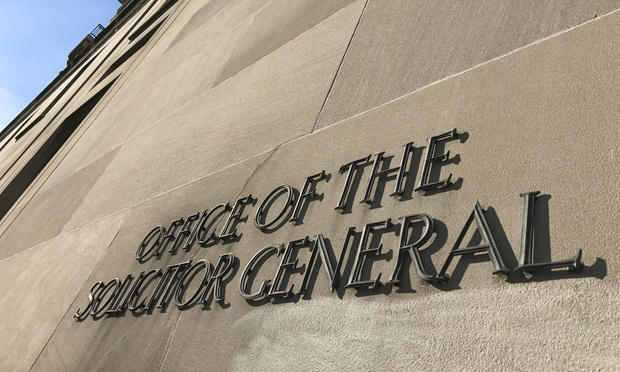At the Supreme Court, the Justice Dept. Fights a Navy Vet's $35K Fee Request
The dispute confronts provisions of the Equal Access to Justice Act, a law that allows "prevailing party" plaintiffs in certain instances to recoup litigation fees in cases involving federal agencies.
April 02, 2020 at 02:50 PM
5 minute read
 U.S. solicitor general's office at Main Justice. Photo: Mike Scarcella/ ALM
U.S. solicitor general's office at Main Justice. Photo: Mike Scarcella/ ALM
The Trump administration's Justice Department is urging the U.S. Supreme Court to reject a Vietnam veteran's attempt to collect $35,000 in legal fees for his landmark court victory opening potentially billions of dollars in Agent Orange benefits to thousands of so-called "blue water" Navy service members.
Alfred Procopio, represented by retired Navy Cmdr. John Wells of Slidell, Louisiana, is asking the justices to review a decision by the U.S. Court of Appeals for the Federal Circuit that said he is not entitled to fees and costs under the federal Equal Access to Justice Act. The en banc court in September sided with the Justice Department in a one-line summary decision rejecting Procopio's fee request.
Procopio's fee request involves provisions of the Equal Access to Justice Act, a law that allows "prevailing party" plaintiffs in certain instances to recoup litigation fees in cases involving federal agencies.
Procopio sought legal fees after his victory in January 2019 in the case Procopio v. Wilkie. The Federal Circuit, ruling 9-2, said for the first time that the Agent Orange Act of 1991 and its presumption of exposure to the chemical herbicide applies to Navy veterans who served on ships within the 12-mile territorial sea of the Republic of Vietnam. The Justice Department had argued those benefits applied only to soldiers on land or inland waterways.
The benefits potentially owed to roughly 90,000 vets have been estimated to cost the government more than $1 billion over 10 years.
The Equal Access to Justice Act permits an award of fees when the government's litigation position was not "substantially justified." In his Supreme Court petition, Wells heavily relied on a concurring opinion written by Judge Kathleen O'Malley of the U.S. Court of Appeals for the Federal Circuit. The judge said that although she was bound by Supreme Court and circuit precedents to rule against Procopio, the disabled Vietnam vet was "the very type of prevailing party, moreover, for whom Congress enacted the EAJA."
O'Malley said "the governing interpretation of 'substantially justified' sets the bar far too low for the government in a way that is contrary to the plain text of the EAJA and its underlying purpose."
 Judge Kathleen O'Malley of the Federal Circuit. Courtesy photo.
Judge Kathleen O'Malley of the Federal Circuit. Courtesy photo.In the Justice Department's brief opposing Procopio's petition, U.S. Solicitor General Noel Francisco said the justices have interpreted the term "substantially justified" to mean "'justified in substance or in the main'—that is, justified to a degree that could satisfy a reasonable person."
The central issue in the merits case before the Federal Circuit was the interpretation of service "in the Republic of Vietnam" in order to establish the federal Agent Orange Act's presumption of service connection and benefits eligibility. Although the appellate court disagreed with the government's decades-long interpretation that the 1991 act covered only those veterans who served on the ground or inland waterways, Francisco wrote, that was not the only reasonable way to read the statutory language.
It was "reasonable," Francisco argued, for the government "to rely on the ordinary understanding of the term 'Republic of Vietnam,' rather than on the specialized, international-law-based construction that the en banc court ultimately adopted."
In its 2019 decision, the Federal Circuit majority, led by Judge Kimberly Moore, said that the intent of Congress was clear from its use of the term "in the Republic of Vietnam," in the Agent Orange Act, "which all available international law unambiguously confirms includes its territorial sea." The majority also overruled the court's 2008 decision in Haas v. Peake.
The Haas court, Moore said, "went astray" when it found ambiguity in the Agent Orange Act, an ambiguity injected into the regulations by the government after the act was adopted. Mel Bostwick, partner in Orrick Herrington & Sutcliffe, argued pro bono on behalf of Procopio.
Francisco also rejected Procopio's argument that the legal-fee standard should be more demanding for the government in veteran benefits cases because of Congress's command that benefits to members of the Armed Forces are to be construed in the beneficiaries' favor.
"If Congress had intended that attorney's fees be more readily available to prevailing veterans than to other persons who litigate against the government, it could have enacted a separate attorney's-fee provision specifically governing veterans'-benefits cases," Francisco wrote.
Under the Supreme Court's rules, Procopio may file a reply brief addressing the government's arguments.
Read more:
When Must the U.S. Pay Legal Fees? A Vietnam Vet Turns to the Supreme Court
Justice Department Will Not Challenge Benefits for Blue Water Navy Vets
Justice Dept. Faces Pressure to Resist Appealing Vietnam Vets' Landmark Victory
This content has been archived. It is available through our partners, LexisNexis® and Bloomberg Law.
To view this content, please continue to their sites.
Not a Lexis Subscriber?
Subscribe Now
Not a Bloomberg Law Subscriber?
Subscribe Now
NOT FOR REPRINT
© 2025 ALM Global, LLC, All Rights Reserved. Request academic re-use from www.copyright.com. All other uses, submit a request to [email protected]. For more information visit Asset & Logo Licensing.
You Might Like
View All
GOP Now Holds FTC Gavel, but Dems Signal They'll Be a Rowdy Minority
6 minute read
Fired by Trump, EEOC's First Blind GC Lands at Nonprofit Targeting Abuses of Power
3 minute read
Latham Adds Former Treasury Department Lawyer for Cross-Border Deal Guidance
2 minute read
'Erroneous Rulings'?: Wilmer Asks 4th Circuit to Overturn Mosby's Criminal Convictions
3 minute readLaw Firms Mentioned
Trending Stories
- 1Public Notices/Calendars
- 2Wednesday Newspaper
- 3Decision of the Day: Qui Tam Relators Do Not Plausibly Claim Firm Avoided Tax Obligations Through Visa Applications, Circuit Finds
- 4Judicial Ethics Opinion 24-116
- 5Big Law Firms Sheppard Mullin, Morgan Lewis and Baker Botts Add Partners in Houston
Who Got The Work
J. Brugh Lower of Gibbons has entered an appearance for industrial equipment supplier Devco Corporation in a pending trademark infringement lawsuit. The suit, accusing the defendant of selling knock-off Graco products, was filed Dec. 18 in New Jersey District Court by Rivkin Radler on behalf of Graco Inc. and Graco Minnesota. The case, assigned to U.S. District Judge Zahid N. Quraishi, is 3:24-cv-11294, Graco Inc. et al v. Devco Corporation.
Who Got The Work
Rebecca Maller-Stein and Kent A. Yalowitz of Arnold & Porter Kaye Scholer have entered their appearances for Hanaco Venture Capital and its executives, Lior Prosor and David Frankel, in a pending securities lawsuit. The action, filed on Dec. 24 in New York Southern District Court by Zell, Aron & Co. on behalf of Goldeneye Advisors, accuses the defendants of negligently and fraudulently managing the plaintiff's $1 million investment. The case, assigned to U.S. District Judge Vernon S. Broderick, is 1:24-cv-09918, Goldeneye Advisors, LLC v. Hanaco Venture Capital, Ltd. et al.
Who Got The Work
Attorneys from A&O Shearman has stepped in as defense counsel for Toronto-Dominion Bank and other defendants in a pending securities class action. The suit, filed Dec. 11 in New York Southern District Court by Bleichmar Fonti & Auld, accuses the defendants of concealing the bank's 'pervasive' deficiencies in regards to its compliance with the Bank Secrecy Act and the quality of its anti-money laundering controls. The case, assigned to U.S. District Judge Arun Subramanian, is 1:24-cv-09445, Gonzalez v. The Toronto-Dominion Bank et al.
Who Got The Work
Crown Castle International, a Pennsylvania company providing shared communications infrastructure, has turned to Luke D. Wolf of Gordon Rees Scully Mansukhani to fend off a pending breach-of-contract lawsuit. The court action, filed Nov. 25 in Michigan Eastern District Court by Hooper Hathaway PC on behalf of The Town Residences LLC, accuses Crown Castle of failing to transfer approximately $30,000 in utility payments from T-Mobile in breach of a roof-top lease and assignment agreement. The case, assigned to U.S. District Judge Susan K. Declercq, is 2:24-cv-13131, The Town Residences LLC v. T-Mobile US, Inc. et al.
Who Got The Work
Wilfred P. Coronato and Daniel M. Schwartz of McCarter & English have stepped in as defense counsel to Electrolux Home Products Inc. in a pending product liability lawsuit. The court action, filed Nov. 26 in New York Eastern District Court by Poulos Lopiccolo PC and Nagel Rice LLP on behalf of David Stern, alleges that the defendant's refrigerators’ drawers and shelving repeatedly break and fall apart within months after purchase. The case, assigned to U.S. District Judge Joan M. Azrack, is 2:24-cv-08204, Stern v. Electrolux Home Products, Inc.
Featured Firms
Law Offices of Gary Martin Hays & Associates, P.C.
(470) 294-1674
Law Offices of Mark E. Salomone
(857) 444-6468
Smith & Hassler
(713) 739-1250








